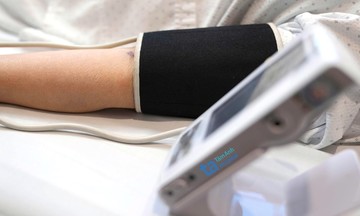People with diabetes need to take medication as prescribed by their doctor, reduce carbohydrate intake, and exercise regularly to manage their blood sugar. Small daily habits can also help improve blood sugar levels and prevent the risk of diabetes complications.
Prioritize vegetables.
The order in which you eat can directly affect your blood sugar after meals. People with diabetes should eat non-starchy vegetables like broccoli, zucchini, and dark leafy greens first, followed by protein and then starches. Consuming fiber-rich foods (such as non-starchy vegetables) first reduces the speed of digestion in the stomach, contributing to a slower release of carbohydrates and preventing sudden spikes in blood sugar. Eating protein or healthy fats first has a similar effect.
Patients can eat eggs, chicken, or fish first, and finish the meal with a portion of carbohydrates, which will minimize blood sugar fluctuations. This eating order can also help with weight management.
Chew your food thoroughly.
Eating quickly can lead to increased blood sugar levels. Therefore, individuals with diabetes should allocate sufficient time for each meal and practice mindful eating. Chewing food thoroughly, eating slowly, and paying attention helps break down food properly, making it easier to digest and absorb nutrients. The habit of eating slowly and chewing thoroughly can also promote the release of satiety hormones, thereby limiting overeating, improving insulin response, and minimizing the impact on blood sugar levels.
Monitor your blood sugar.
Regularly checking and recording blood sugar levels can optimize blood sugar control. Patients should check these levels at the same time each day for consistent monitoring, allowing doctors to adjust medication accordingly.
Practice deep breathing.
The body and mind are closely connected. When stressed, the body reacts by releasing a large amount of the hormone cortisol. High cortisol levels can increase blood sugar. This prolonged condition increases the risk of diabetes complications.
Deep breathing can reduce stress hormones, creating a sense of relaxation, thereby regulating blood sugar levels. Box breathing is easy to perform: start by inhaling for 4 seconds, holding for 4 seconds, exhaling for 4 seconds, and then repeating this cycle about 10-15 times.
Take a walk after meals.
Taking a short walk 30 minutes after dinner burns calories and helps muscles transport sugar from the blood into cells, naturally lowering blood sugar after meals. Walking outdoors in the evening also contributes to increased physical activity and stress reduction.
Combine carbohydrates with protein.
Whenever eating carbohydrate-rich foods like crackers, bread, or rice, people with diabetes should also combine them with protein. This simple combination slows down the conversion of carbohydrates into glucose, stabilizing blood sugar levels and increasing feelings of fullness. Protein also helps maintain lean muscle mass, which in turn increases insulin sensitivity and improves blood sugar control.
Anh Chi (According to Eating Well)
| Readers can submit questions about diabetes here for doctors to answer. |












